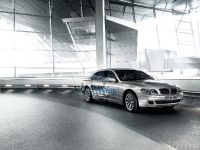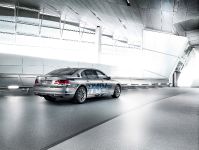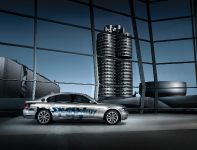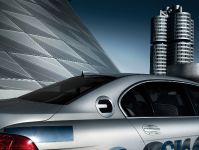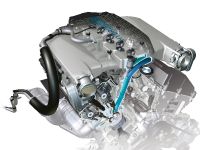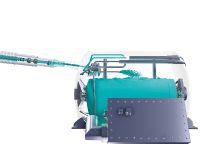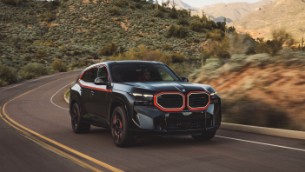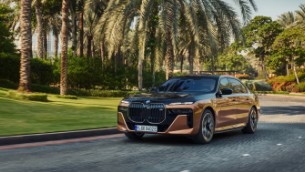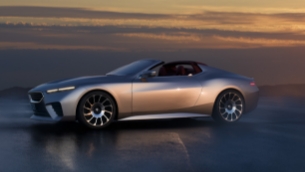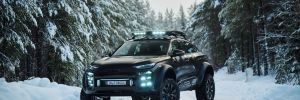BMW Hydrogen 7 Rolls Into Los Angeles To Complete The 2008 Hydrogen Road Tour
The BMW Hydrogen 7 - the first hydrogen-powered luxury sedan - pulled into Los Angeles this morning to finish a more than 4,000 mile cross-country journey featuring hydrogen-powered cars by the world's leading automakers in the 2008 Hydrogen Road Tour. The purpose of the tour was to show that leading automakers and energy producers are doing their part to move away from fossil fuels to hydrogen, and showcase the cooperation among forward-thinking lawmakers, NGOs, the DOT, DOE and the industry. Logging an unprecedented "strictly hydrogen" cruising range of over 200 miles, the BMW Hydrogen 7 mono-fuel completed the two-week, 31 city tour, tour with outstanding reliability, leaving only a trail of potable water vapor in its tracks. The 200-mile cruising range is equivalent to over 25mpg. In the BMW Hydrogen 7 bi-fuel vehicle, the cruising range topped 125 miles. By optimizing the combustion process in the mono-fuel Hydrogen 7, we achieved an increase in range of over 60% over the bi-fuel Hydrogen 7.
Senator Olympia Snowe of Maine kicked off the tour by driving a BMW Hydrogen 7 off the starting line when the tour began in Portland, ME on August 11.
BMW provided a fleet of four hydrogen-powered cars – two BMW Hydrogen 7 mono-fuel vehicles that use only liquid hydrogen and two BMW Hydrogen 7 bi-fuel vehicles that can switch from hydrogen to gasoline. The four BMW vehicles along with the core BMW CleanEnergy team were on the road for the entire two-week tour.
The Hydrogen Road Tour is a partnership with the U.S. Department of Transportation, U.S. Department of Energy, the California Fuel Cell Partnership and the National Hydrogen Association. In addition to BMW, participants included Daimler, GM, Honda, Hyundai-Kia, Nissan, Toyota, and VW. Providing clean, domestically produced hydrogen fuel for this tour were Linde, BMW's hydrogen fuel partner for the Tour, and Air Products.
"The miles covered on this tour are a highly valuable contribution to the nearly 2 million miles already logged by our global fleet of 100 BMW Hydrogen 7s. This tour has shown thousands of people that hydrogen is truly the best alternative transportation fuel, and hydrogen vehicles are approaching commercial availability. An internal combustion engine, powered by hydrogen should play an important role in the future of sustainable mobility," said Tom Baloga, BMW Vice President of Engineering, US. "What we have learned in these past two weeks is that there is intense enthusiasm, among the public and among our nation's legislators, in hydrogen as a viable alternative to fossil fuels. The next step is to extend the nation's hydrogen refueling infrastructure from coast to coast."
What was most noteworthy about the Hydrogen Road Tour was the partnership between the world's leading automakers, key federal departments, influential non-governmental organizations and hydrogen fuel providers to bring the reality of practical, clean energy to our nation's legislators and the public. The tour visited key members of Congress in their home states to allow them the opportunity to see and drive these vehicles.
BMW Hydrogen 7 was the only vehicle on the tour that stores liquid hydrogen to power an internal combustion engine. Hydrogen is one of the cleanest energy sources available. Essentially the only tailpipe emission is water vapor.
Mono-fuel Hydrogen 7 actually cleans the air
The tour fleet included the mono-fuel version of the BMW Hydrogen 7, equipped with a V12 internal combustion engine (ICE), which has been engineered to run exclusively on hydrogen. It was created to showcase the zero CO2 and low emissions potential and feasibility of a dedicated hydrogen internal combustion engine (ICE).
The Hydrogen 7's V12 mono-fuel ICE produces no CO2 and near-zero emissions, while not sacrificing performance. In fact, the tailpipe emissions are so infinitesimal they pushed the limits of current emission testing technology.
Independent authorities, including the Argonne National Laboratory (ANL), have confirmed these results. ANL conducted emission tests on BMW Hydrogen 7 mono-fuel vehicles in early March 2008 and found that not only were the emissions infinitesimally small but when running, the vehicle actually cleaned the air.
Exhaust emissions clean enough to drink
Recent studies have also confirmed the water emitted by the Hydrogen 7 is potable, i.e., safe to drink.
Exhaust from the mono-fuel Hydrogen 7 tested by FGL Environmental was found to be well within the limits set by the U.S. Environmental Protection Agency (EPA) for safe drinking water standards. The Maximum Contaminant Limit, abbreviated MCL, is the maximum limit set by the EPA for chemicals found in drinking water. Results showed the MCL from mono-fuel H7 emissions to be in compliance with the health safety standards.
BMW Hydrogen 7 on the road
For more than a year, the BMW fleet of bi-fuel Hydrogen 7s has been an important milestone on the road to a hydrogen future, with more than 150 Pioneers driving nearly 2 million miles so far. The Pioneer Program, as it is called, has provided the flexibility of being able to gather real-world driving experience driving on hydrogen with the peace of mind that comes from knowing you won't run out of fuel. In addition to the BMW hydrogen pioneers, hundreds of people from academia, students, media, as well as the general public, have had the opportunity to experience the BMW Hydrogen 7.
